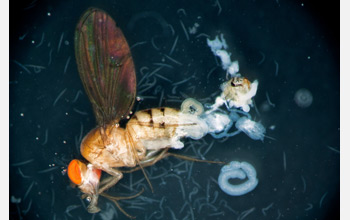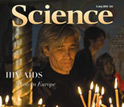News Release 10-114
New Way to Conquer Disease-Causing Nematodes in Flies has Implications for Human Diseases
Flies developed protection through alternative form of evolution

A dissected Drosophila fly, parasitized by a nematode, is shown.
July 8, 2010
View a video interview (clip 1, clip 2, clip 3) with Dr. John Jaenike of the University of Rochester.
This material is available primarily for archival purposes. Telephone numbers or other contact information may be out of date; please see current contact information at media contacts.
A Science article published on July 9, 2010, describes the discovery of an alternative form of evolution that helps Drosophila flies conquer nematodes that sterilize them. Nematodes are among the most abundant, diverse and destructive parasites of plants and animals.
The article, titled, "Adaptation via Symbiosis; Recent Spread of a Drosophila Defensive Symbiont," is by John Jaenike of the University of Rochester and his colleagues. In a video interview, Jaenike explains the results of this study and their implications for developing treatments for serious human diseases, including river blindness, caused by nematodes; about 17.7 million people worldwide are currently infected with river blindness.
"The protection of an insect from a potent nematode parasite by a bacterial infection is of potential importance in both medicine and agriculture," says George Gilchrist, a program director at the National Science Foundation. "This study adds a new page to the catalogue of interactions between animals and bacteria."
The Science study is also discussed in a press release from the University of Rochester.
-NSF-
-
View Video
Meet the enemy: nematodes
Credit and Larger Version -
View Video
Study results
Credit and Larger Version -
View Video
Implications for fighting human diseases
Credit and Larger Version -
This research is detailed in the July 9, 2010 issue of Science.
Credit and Larger Version
Media Contacts
Lily Whiteman, National Science Foundation, (703) 292-8310, email: lwhitema@nsf.gov
Melissa Greco-Lopes, University of Rochester, (585) 276-3693, email: mgrecolo@admin.rochester.edu
Program Contacts
George Gilchrist, National Science Foundation, (703) 292-7130, email: ggilchri@nsf.gov
Principal Investigators
John Jaenike, University of Rochester, (585) 275-0009, email: john.jaenike@rochester.edu
The U.S. National Science Foundation propels the nation forward by advancing fundamental research in all fields of science and engineering. NSF supports research and people by providing facilities, instruments and funding to support their ingenuity and sustain the U.S. as a global leader in research and innovation. With a fiscal year 2023 budget of $9.5 billion, NSF funds reach all 50 states through grants to nearly 2,000 colleges, universities and institutions. Each year, NSF receives more than 40,000 competitive proposals and makes about 11,000 new awards. Those awards include support for cooperative research with industry, Arctic and Antarctic research and operations, and U.S. participation in international scientific efforts.
Connect with us online
NSF website: nsf.gov
NSF News: nsf.gov/news
For News Media: nsf.gov/news/newsroom
Statistics: nsf.gov/statistics/
Awards database: nsf.gov/awardsearch/
Follow us on social
Twitter: twitter.com/NSF
Facebook: facebook.com/US.NSF
Instagram: instagram.com/nsfgov






